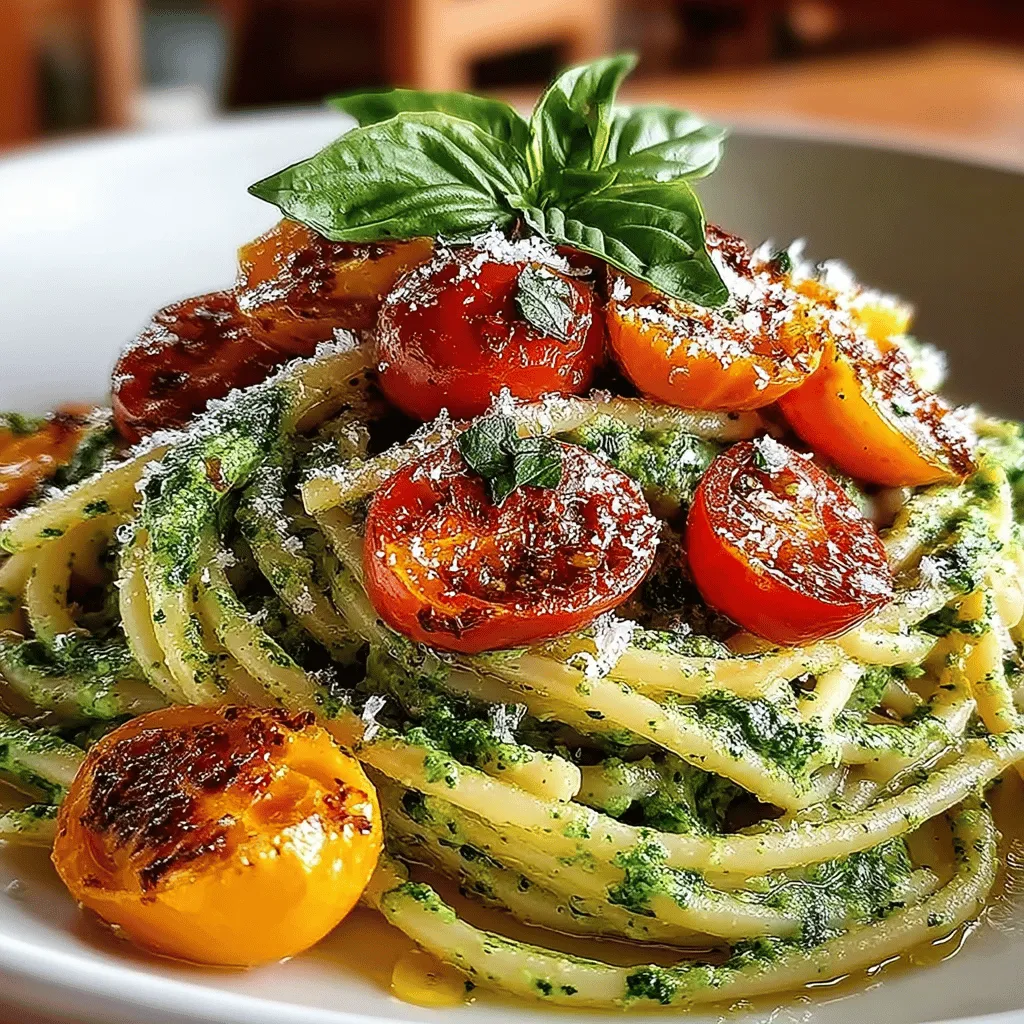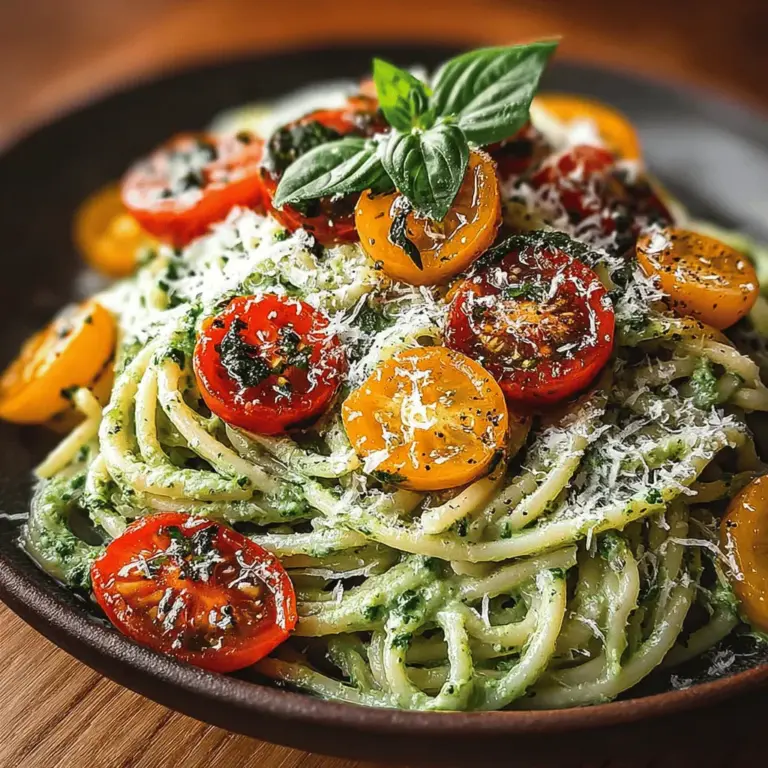Creamy Avocado Pasta with Basil: A Delicious and Healthy Meal Option
In recent years, avocado-based dishes have surged in popularity, becoming a staple in many households and restaurants alike. This creamy, nutrient-rich fruit is celebrated not only for its unique flavor but also for its impressive health benefits. Among the myriad of avocado recipes, Creamy Avocado Pasta with Basil stands out as a delightful fusion of taste and nutrition. This dish is not only quick to prepare but also caters to various dietary preferences, making it an excellent choice for anyone looking to enjoy a satisfying meal without compromising on health.
Creamy Avocado Pasta offers a delectable combination of textures and flavors that delight the palate. With its smooth, creamy sauce derived entirely from ripe avocados, this pasta dish is perfect for those seeking a rich yet wholesome alternative to traditional creamy pasta recipes. Whether you are vegan, vegetarian, or simply looking to incorporate more plant-based meals into your diet, this recipe ticks all the boxes. It’s a versatile dish that can be customized with various add-ins or garnishes, ensuring that it can be tailored to suit individual tastes and dietary needs.
Ingredients Breakdown
Before we dive into the cooking process, let’s take a closer look at the key ingredients that make Creamy Avocado Pasta with Basil a standout dish, along with their roles and benefits.
Pasta of Choice
The foundation of any pasta dish is, of course, the pasta itself. While spaghetti is a popular choice for this recipe, feel free to experiment with other types of pasta such as fettuccine, penne, or even gluten-free options. Each type of pasta brings a unique texture and mouthfeel to the dish. For instance, thinner pastas like spaghetti will allow the creamy sauce to coat the noodles more evenly, while chunkier shapes like penne can provide delightful pockets of flavor.
Ripe Avocados
The star ingredient in this recipe is undoubtedly the avocado. To achieve the creamy consistency that makes this dish special, it’s crucial to use ripe avocados. When perfectly ripe, avocados are buttery and smooth, lending a luxurious texture to the sauce. An under-ripe avocado may result in a grainy sauce, while an overripe one can lead to an undesirable flavor. For the best results, look for avocados that yield slightly to pressure when gently squeezed.
Fresh Basil Leaves
Basil adds a burst of freshness and aromatic flavor that complements the richness of the avocado. Using fresh basil leaves is essential, as dried herbs lack the vibrant taste and fragrance. Basil also boasts numerous health benefits, including anti-inflammatory properties and a high concentration of antioxidants. When combined with the creamy avocado, fresh basil elevates the dish to a whole new level.
Garlic
Garlic is another key player in this recipe, contributing its distinctive aromatic qualities and health benefits. Known for its immune-boosting properties and ability to enhance overall health, garlic adds depth to the sauce. For this dish, fresh garlic is recommended, as it provides a robust flavor that pairs beautifully with both avocado and basil.
Lemon Juice
A touch of lemon juice is essential for balancing the flavors in the creamy avocado sauce. The acidity of the lemon brightens the overall dish, cutting through the richness of the avocado and adding a refreshing zing. Moreover, lemon juice is rich in vitamin C, providing an extra nutritional boost.
Olive Oil
Using high-quality olive oil not only enhances the flavor of the dish but also contributes to its health benefits. Olive oil is known for its heart-healthy monounsaturated fats and antioxidants. When drizzled into the avocado sauce, it adds a smooth richness that ties all the flavors together.
Parmesan Cheese and Nutritional Yeast
For those who enjoy a cheesy flavor, grated Parmesan cheese can be added to the sauce. However, for a vegan alternative, nutritional yeast serves as an excellent substitute. Nutritional yeast provides a cheesy taste while also being packed with B vitamins, making it a popular ingredient in plant-based cooking. The choice between Parmesan and nutritional yeast allows this dish to cater to various dietary preferences.
Optional Ingredients
To elevate the dish further, consider adding optional ingredients such as red pepper flakes for a hint of heat or cherry tomatoes for a burst of sweetness and color. These additions not only enhance the flavor profile but also increase the visual appeal of the dish.
Step-by-Step Cooking Instructions
Now that you’re familiar with the essential ingredients, let’s move on to the cooking process. This recipe is designed to be straightforward, allowing you to whip up a delicious meal in no time.
Cooking the Pasta
1. Boil Water: Start by bringing a large pot of salted water to a rolling boil. The salt is crucial as it helps season the pasta as it cooks.
2. Add Pasta: Once the water is boiling, add your choice of pasta. For spaghetti, cook according to the package instructions, usually around 8 to 10 minutes, until it reaches an al dente texture. Al dente pasta will have a slight bite, making it the ideal base for the creamy sauce.
3. Reserve Pasta Water: Before draining the pasta, be sure to reserve about a cup of the pasta cooking water. This starchy water is essential for achieving the desired sauce consistency later on.
4. Drain Pasta: Drain the pasta in a colander, but avoid rinsing it, as this can wash away the starch that helps the sauce adhere to the noodles.
Preparing the Creamy Avocado Sauce
1. Scoop Avocados: While the pasta is cooking, cut the ripe avocados in half, remove the pit, and scoop the flesh into a food processor or blender.
2. Add Ingredients: To the avocados, add the fresh basil leaves, minced garlic, lemon juice, and olive oil. If using Parmesan cheese or nutritional yeast, add it at this stage as well.
3. Blend to Smoothness: Blend the mixture until smooth and creamy. You may need to stop and scrape down the sides of the processor to ensure everything is well combined. Depending on the ripeness of the avocados, you may need to add a splash of reserved pasta water to help achieve the desired consistency.
4. Adjust Thickness: Once the sauce reaches a smooth texture, check the thickness. If it seems too thick, gradually add more reserved pasta water until you achieve a creamy, pourable consistency.
With the pasta cooked and the creamy avocado sauce prepared, you’re well on your way to enjoying a delicious meal. In the next part of this article, we’ll cover how to combine these elements and serve your Creamy Avocado Pasta with Basil, along with some creative serving suggestions. Stay tuned for the final touches that will elevate this dish to a stunning culinary experience!

Combining Pasta and Sauce Effectively
Once your pasta is cooked to al dente perfection, it’s time to bring it all together with the luscious creamy avocado sauce. Start by reserving a cup of the pasta cooking water before draining the pasta. This starchy water is a secret weapon for achieving the ideal sauce consistency.
In a large mixing bowl or the same pot used for cooking the pasta, add the drained pasta along with the creamy avocado sauce. Begin to gently toss the pasta with the sauce, ensuring every strand is coated. If the sauce appears too thick, gradually add the reserved pasta water, one tablespoon at a time, until you reach your desired consistency. The goal is to create a silky, creamy coating that clings to the pasta without being runny.
Techniques for Ensuring Even Coating and Flavor Distribution
To ensure that the pasta is evenly coated with the sauce, it is crucial to use gentle folding motions rather than aggressive stirring. This technique helps to maintain the integrity of the pasta while distributing the sauce evenly. Use tongs or a large fork to lift the pasta and allow the sauce to envelop it. If you notice that some areas are still lacking sauce, you can use a spatula to scrape the sides of the bowl and fold those portions into the mix.
For a final touch of flavor, consider adding a splash of fresh lemon juice to the pasta. The acidity brightens the dish and enhances the flavor profile of the avocado. Once everything is well combined, give it a taste, and adjust the seasoning as needed.
Final Seasoning and Incorporation of Cheese or Nutritional Yeast
To elevate the flavor of your Creamy Avocado Pasta, now is the time to incorporate cheese or nutritional yeast. If you’re not following a vegan diet, freshly grated Parmesan cheese adds a wonderful umami flavor that complements the creaminess of the avocado. For those on a vegan or dairy-free diet, nutritional yeast is an excellent alternative, providing a cheesy flavor without the dairy.
Sprinkle your choice of cheese or nutritional yeast over the pasta and gently mix it in. This will create a rich depth of flavor that pairs beautifully with the avocado.
Balancing Flavors with Salt, Pepper, and Optional Heat
Taste your pasta one more time before serving. This is the perfect moment to balance the flavors. Sprinkle sea salt and freshly ground black pepper to enhance all the flavors in the dish. If you enjoy a bit of heat, consider adding a pinch of red pepper flakes or a dash of hot sauce. These additions will provide a subtle kick that works harmoniously with the creamy avocado sauce.
Serving Suggestions
Presentation Tips for Serving Creamy Avocado Pasta
When it comes to serving Creamy Avocado Pasta, presentation is key. A well-plated dish not only looks appetizing but also enhances the dining experience. Start by twirling the pasta into nests on the plates using a fork or tongs. This technique creates a beautiful mound that invites your guests to dig in.
How to Plate for Aesthetic Appeal
To enhance the aesthetic appeal, consider using a white plate to make the vibrant green color of the avocado sauce pop. After plating, drizzle a bit of high-quality extra virgin olive oil over the top for a glossy finish. You can also garnish with a few whole basil leaves or microgreens for added color and freshness.
Suggestions for Additional Garnishes Beyond Cherry Tomatoes and Basil
While cherry tomatoes and basil are traditional garnishes, you can get creative with your toppings. Here are a few suggestions:
– Toasted Pine Nuts or Walnuts: Add a crunchy texture and nutty flavor.
– Zest of Lemon: A sprinkle of lemon zest adds a bright, citrusy aroma.
– Arugula or Spinach: Toss in some fresh greens for a pop of color and extra nutrients.
– Balsamic Reduction: A drizzle of balsamic reduction provides a tangy sweetness that complements the dish beautifully.
Nutritional Information
Overview of the Nutritional Benefits of the Key Ingredients
Creamy Avocado Pasta is not only delicious but also packed with nutritional benefits. Here’s a closer look at the key ingredients and their health advantages:
– Avocados: Rich in healthy monounsaturated fats, avocados contribute to heart health and help lower bad cholesterol levels. They are also a great source of vitamins E, K, and C, as well as potassium and fiber.
– Olive Oil: Extra virgin olive oil is renowned for its anti-inflammatory properties and is a staple of the Mediterranean diet. It is rich in antioxidants and heart-healthy fats.
– Parmesan Cheese or Nutritional Yeast: Parmesan cheese adds calcium and protein, while nutritional yeast provides B vitamins and protein without the dairy.
– Pasta: Whole grain or legume-based pasta options add fiber, which is important for digestive health.
Healthy Fats from Avocados and Olive Oil
The healthy fats found in avocados and olive oil are essential for overall health. They help in nutrient absorption and contribute to satiety, making you feel full and satisfied after your meal.
Protein Content from Parmesan or Nutritional Yeast
Depending on your choice of cheese or nutritional yeast, you will gain a good amount of protein, essential for muscle repair and overall body function.
Fiber Content from Pasta and Avocados
The combination of pasta and avocados provides a significant amount of dietary fiber. Fiber is crucial for maintaining a healthy digestive system and can help regulate blood sugar levels.
Dietary Considerations for Various Lifestyles
For those following a gluten-free diet, consider using gluten-free pasta made from brown rice, quinoa, or chickpeas. This ensures that everyone can enjoy this delightful dish without compromising on their dietary needs.
Variations and Customizations
Suggestions for Adding Proteins for a Heartier Meal
To make your Creamy Avocado Pasta even more filling, consider adding a protein source. Grilled chicken, shrimp, or even sautéed tofu can complement the pasta beautifully and transform it into a complete meal.
Vegan Adaptations and Other Ingredient Substitutions
For a completely vegan dish, ensure that you use nutritional yeast instead of cheese, and opt for whole grain or legume pasta that is free from eggs. You can also substitute traditional pasta with spiralized vegetables like zucchini or carrots for a low-carb option.
Creative Twists with Additional Vegetables or Spices
Feel free to experiment with various vegetables and spices. Some delicious options include:
– Sautéed Spinach: Adds a nutritious boost and vibrant color.
– Sun-Dried Tomatoes: Introduce a sweet and tangy flavor that pairs well with the creaminess of the avocado.
– Roasted Red Peppers: These can add a smoky sweetness to the dish.
– Crushed Garlic or Shallots: Sautéed garlic or shallots can deepen the flavor profile, imparting aromatic notes.
Conclusion
Creamy Avocado Pasta is a simple yet flavorful dish that brings together the creaminess of ripe avocados and the freshness of basil for a delightful meal. Its versatility makes it suitable for various occasions, whether you’re preparing a quick weeknight dinner or impressing guests at a gathering.
With its abundance of healthy fats, fiber, and protein, this dish not only satisfies your taste buds but also nourishes your body. We encourage you to explore the endless possibilities of this recipe, customizing it to fit your preferences and dietary needs. So gather your ingredients and enjoy the creamy, fresh flavors of Creamy Avocado Pasta, a dish that is sure to become a favorite in your culinary repertoire.


